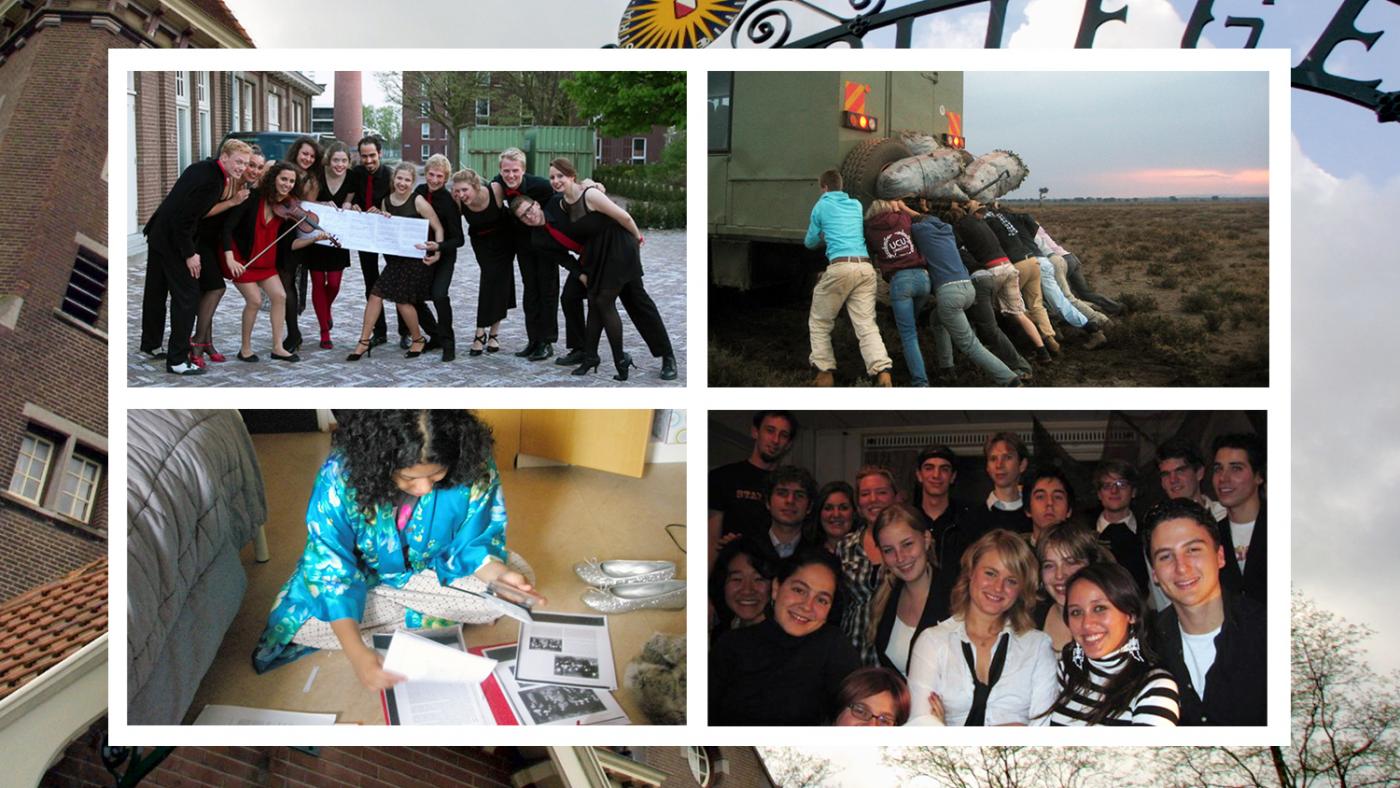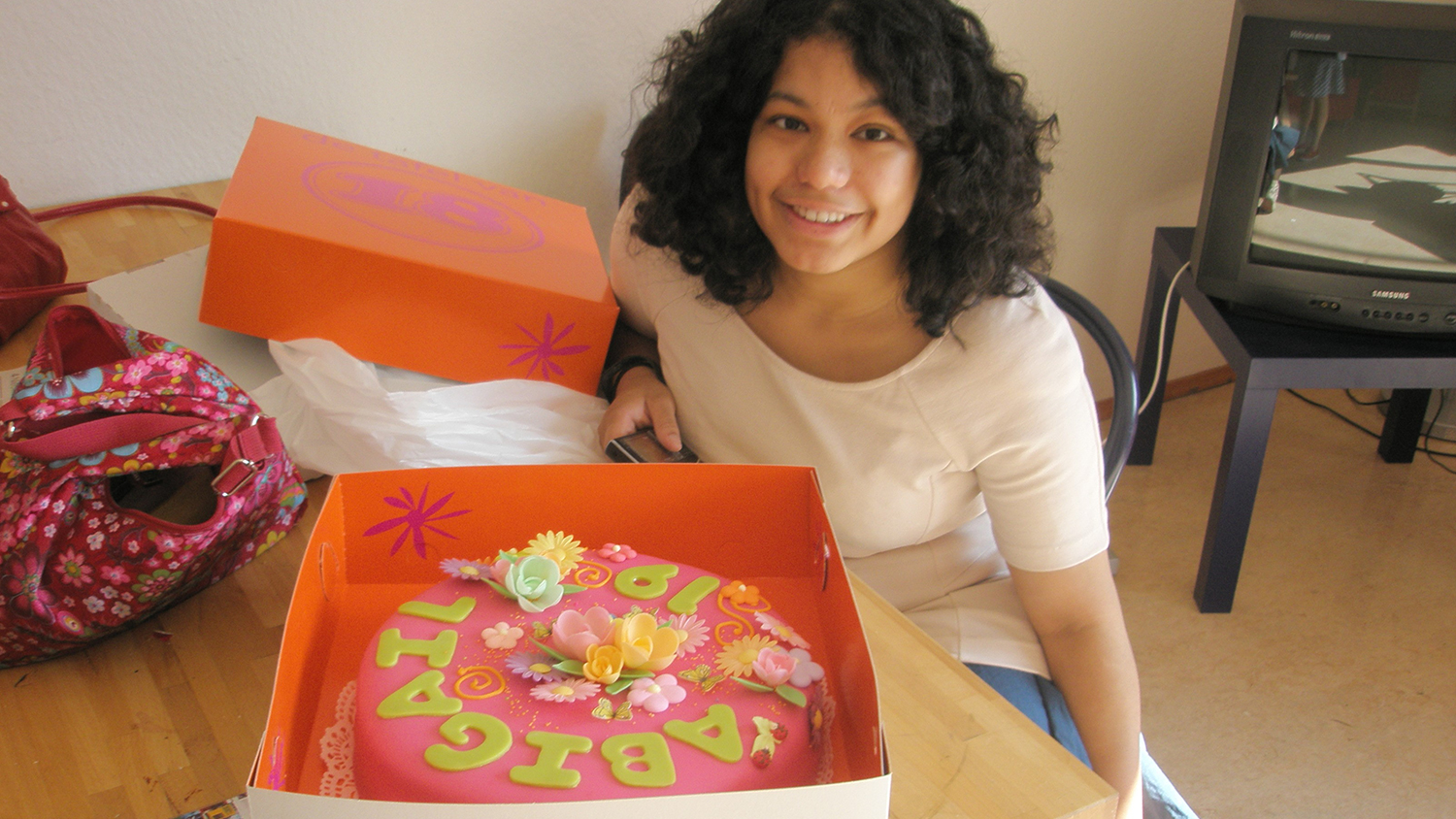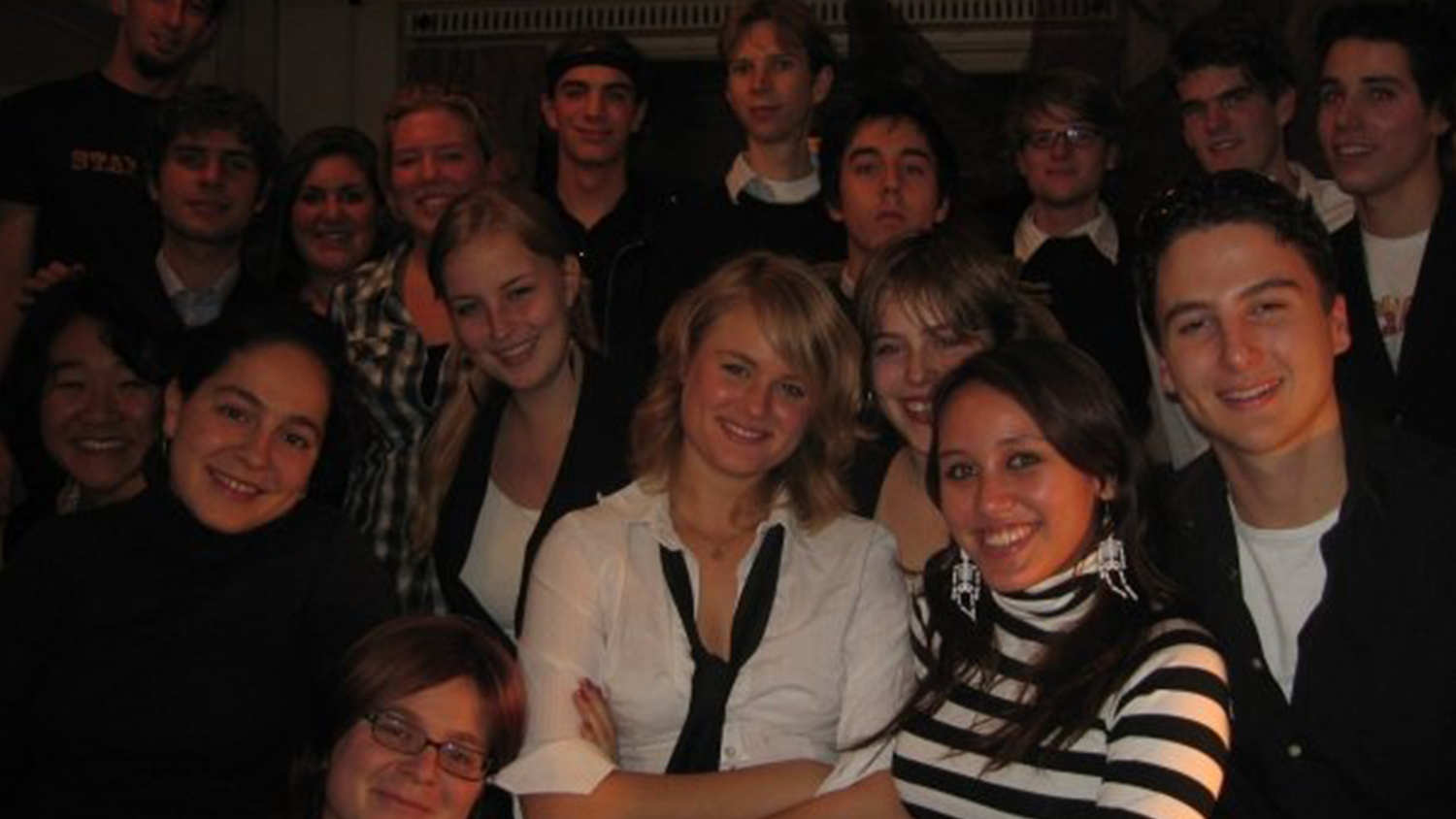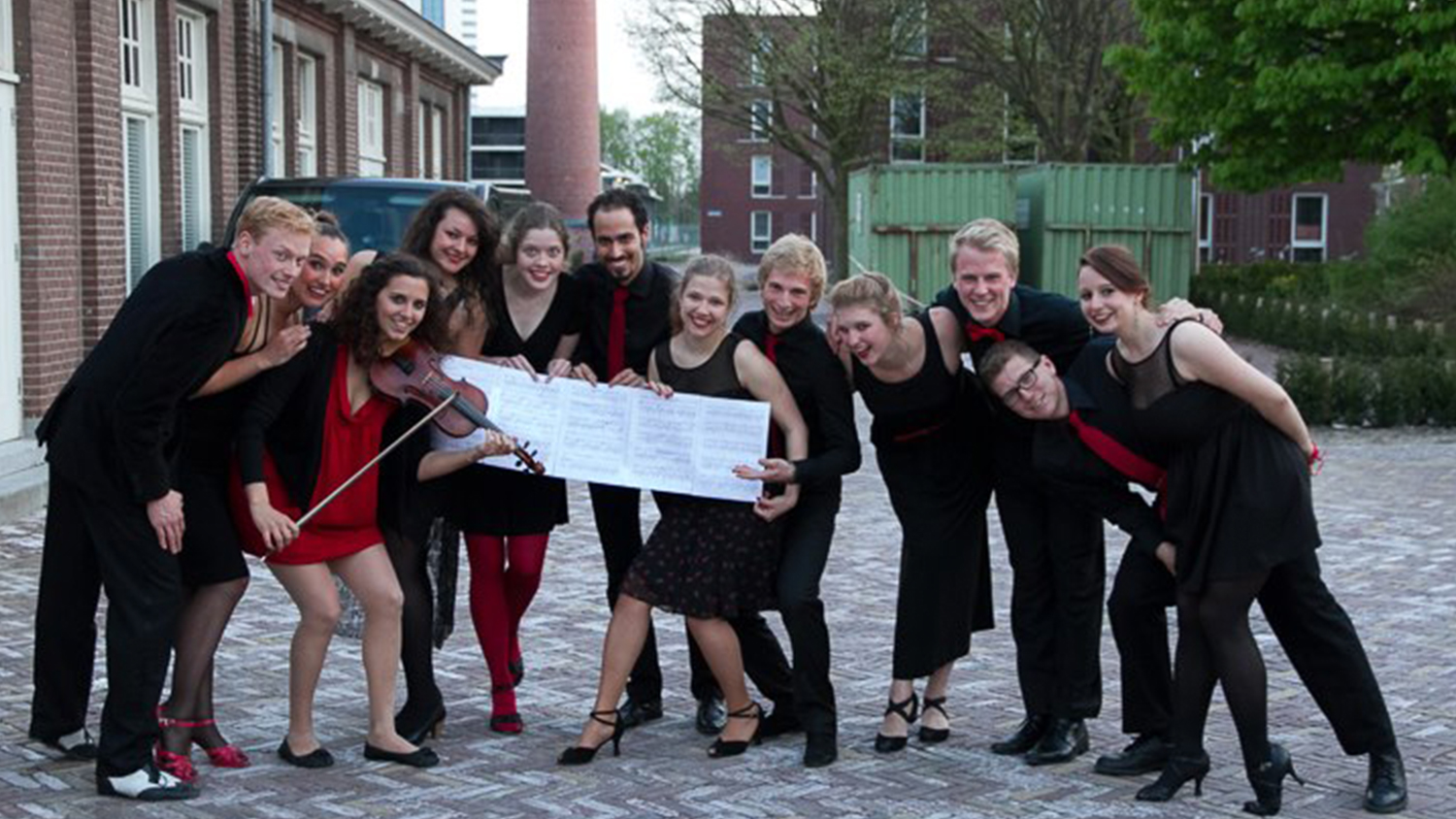Four students look back on their UCU days

DUB got in touch with four UCU alumni and asked them why they chose UCU, how they experienced life on campus, and what they’d recommend to UCU after having finished their own studies.
Shortly after graduating UCU, Jeroen van Baar wrote a book titled De prestatiegeneratie. After his Master’s in Neuroscience & Cognition at the UU, he went on to do a PhD in Nijmegen. He is now a postdoc at Brown University in the United States.Abigail Prade
Abigail Prade is a filmmaker, and recently made a documentary about life at University College. After UCU, she obtained a Master’s degree in Art History from VU University Amsterdam, and went to film school at New York University, Tisch School of the Arts.
Indra Spronk teaches English, Dutch and Intercultural Communication at The Hague University of Applied Sciences and owns a translation company. After UCU, she obtained a Master’s in Heritage Studies from the University of Amsterdam, as well as one in International Communication from the University of Antwerp. She’s also worked at DUB, and the Ministry of Foreign Affairs.
Julia Ertl came to UCU from Austria. After UCU, she followed the Young Innovators honours programme, and afterward, a Master’s in Social and Health Psychology. She recently won the UU prize for Exceptional Extracurricular Affairs with her work group ‘Gewoon Vega’. She now works as a consultant.

Jeroen van Baar: ‘Let students find their own way’
The other day I found a few videos from my time at UCU. My living room in the Kromhout units, IKEA couches, laughter, young faces, long hair. And the hitchhiking competition to Portugal, in October 2008: naive enthusiasm in Limburg, followed by dark humor after waiting in a desolate Flemish village for thirteen hours. I look back at old Facebook photos with the same nostalgia. Racing around campus in a shopping cart, celebrating Halloween at the bar, heavy snowfall in 2010, learning Swahili in Kenya, sailing in Friesland.
UCU does many things well, as is well known. Small-scale education works, even more so when you bring together 600 talented and motivated students. Interdisciplinary education works, especially for mixed disciplines like mine, cognitive neuroscience, a field in which UCU alumni do well. International education works, because a global perspective would enrich practically any study program, and good English skills are invaluable.
But let’s not forget that studying only works if you’re at least a little happy, and intrinsically motivated. I’m currently working as a postdoctoral researcher in the United States, and students here are under high pressure from a young age. During high school, for instance, parents might send their kids to ‘college prep’. These agencies will tell 15-year-old Jayden: you should join the debate team this year, to raise your odds of getting into Harvard. What a fun debate team that’ll be…
Human motivation is more than carrots and sticks, and those who focus on external drivers might actually harm their intrinsic motivation. I spoke with many teachers about this topic for my book De Prestatiegeneratie (The Achievement Generation). What has stuck with me most is the insight an educator from Bussum offered me. He works with children who don’t do well in regular schools. He said: the most important ingredient is trust. I monitor my students less than they’re used to, and that leads to them doing more – and they even start to like it, too.
The people at UCU always ask themselves: how do you guarantee enduring quality? The answer is trust. Ask a lot of your students. Shower them with fascinating insights from every field of human knowledge, because they can handle it. Demand active participation in classes and seminars. But also let your students find their own way, and keep spirits high. Motivate them with compelling questions, not with talk about the successes of the alumni network. Take good care of the public piano in that little room in the Newton building. Don’t erase the writing on the bathroom walls. Leave room for parties, for fraternities and sororities, for theatre and the ski trip. Recruit some students who didn’t get straight As, but who travelled the world after high school and are keen to take up a couple of bar shifts. Accept that they might be hungover in class today, but will submit a fantastic essay two weeks later for a course that they themselves set up, following their own academic interests. And please don’t flaunt the so-called ‘excellence’ of UCU, but stress that there’s simply so much to discover, if you seize the opportunity.
These are lessons that apply to the entire university, but UCU is a prime example. UCU works because it takes its students seriously, both academically and in organizing their own living environment. The students are given the freedom to learn what they want to learn. The students face this challenge head-on with a great sense of responsibility, in diverse social networks. And as we have seen, such trust breeds enthusiasm, and even happiness. Just ask any of the UCU graduates of the past twenty years what they feel when thinking of campus. Nostalgia, of course. That, to me, is a successful college.
Jeroen van Baar was student at UCU from 2008 to 2011.

Abigail Prade: ‘Do your parents work for the embassy too?”
I was seventeen, almost eighteen years old when I started my studies at University College Utrecht. My grandma and grandpa had helped me move into my new room during introduction week. Once they had left and I was alone in my new room in this unfamiliar place, I remember feeling scared, but also excited, thinking: What now?
I had decided to go to UCU, because I wanted to be challenged academically and I was drawn to the international small-scale education and liberal arts and sciences curriculum. If I’m totally honest, I also valued the fact that a lot of UCU alumni went to so-called “good” universities (abroad) and I wanted to be part of that. Nowadays I can put that into perspective, but at the time I thought it was important as well.
As a Humanities student I was in the minority at UCU. Most students were studying politics and economics and it was their dream to work for the United Nations or the European Union. During the introduction week, I remember one of my fellow students asking me: “Do your parents work for the embassy too?” This made me question what kind of place I had decided to attend and if I really belonged there. Unlike many other people, UCU was not a place where I always felt completely at home. I felt like an outsider. UCU to me sometimes came across as elitist, alienating, and a little bit forced. Especially in my third year I had grown tired of living on campus and I desired to get away from “the bubble” and not do everything there. At the same time, I think this is part of the process, because you get older and grow more independent.
My time at UCU has shaped me a lot for the better and I have many experiences that I might not have had if I hadn’t gone to UCU: I went on exchange to the United States, did a summer course in China, was a Humanities representative, did an internship, did volunteer work, and organized weekly movie nights on campus. My friends were always a stone’s throw away from me. Most importantly, it taught me me to work very hard and write many papers. Compared to a regular program the work load at UCU is very high, but the professors at UCU are very dedicated and give students a lot of individual attention, which made me feel motivated and appreciated. I’m still in touch with some of them.
After UCU I did a Master’s program at the VU in Amsterdam. There was a lot less attention for students there and I felt not challenged at all. I became depressed and unmotivated. I think the change was difficult for me, because UCU is a very loving and protected environment, which might make it harder to deal with setbacks.
When I was working on my documentary about 20 years of UCU, I noticed that in many ways UCU is still the same. I do think the administration is more in tune with the negative aspects of perfectionism and the pressure to perform, which a lot of UCU students suffer from. I think this development is a good thing. After all, life isn’t perfect, you aren’t perfect and don’t need to be, and in the end feeling this pressure will work against you. The UCU students I met are as passionate, hardworking, idealistic, and a tad annoying sometimes in their ambition and unspoiled optimism. I wondered then if I was like that back in the day. Of course I was.
Abigail Prade was UCU Student from 2007 to 2010

Indra Spronk: ‘I was a kid in a humongous candy store’
I was midway through my twenties and already done with my studies when I first heard the term ‘first-generation student’. I scoffed at it. As though that somehow qualifies as a lack of privilege. Hadn’t I had the same opportunities and options my fellow students had? Just because I’d been the first one in my entire, extended family to go to college, that didn’t mean anything, did it?
It definitely did, I realized much later (I was never any good at being introspective, really). It’s hard to explain to people who grew up in different circles, but in my family, you went to school to learn how to do a specific job, and then you’d do that job for the rest of your life. The fact that I’d get to study at a university was brilliant, but I was told to ‘please just study psychology or law, so you can be a psychologist or a lawyer’. I had absolutely no notion of the value of academia for its own sake, or, really, of what else was out there. And there’s a good chance I never would have found out if not for University College.
All I knew, as a naïve, wet-behind-the-ears freshman at UCU, was that I didn’t want to be a lawyer or a psychologist, and that I was eager to start studying whatever. Suddenly, I was a kid in a humongous candy store, being able to pick and choose semi-random topics to learn about without having to prioritize one over the other. I probably would’ve gotten lost in the sea of possibilities, but since the UCU experience comes with a personal tutor who guides you through your choices and academic career, as well as instant friendships with people in the same boat as you, you receive a lot of help in finding your way.
Now, I could’ve chosen better subjects. I made some wrong choices (why the hell did I study literature? I never did like to dissect the books I read), I still regret my lack of knowledge of the possibilities, and I definitely would’ve chosen a different path if I’d been better informed. But that was my own responsibility, of course, even if I still believe it was due to a gap in my knowledge that’s typical of first-generation students, and due to this ingrained idea of ‘needing to advance towards a specific career’ - at which I failed miserably, by the way. The point is: I’m thankful for all the opportunities I’ve had to choose, to wander, to try new courses without having to sign up for an entire specific study programme.
I’ve heard people say that first-generation students often feel lost at university, not fitting in, suffering from imposter syndrome. A small-scale, intensive college like UCU, with its close-knit student body and all the guidance it offers, has the power to prevent a large part of this type of problem. Perhaps the biggest issue standing in the way is its elitist nature, and corresponding high fees. I’m thankful that this is something UCU acknowledges and tries to fight with scholarships, among other things, for students like me: those who don’t know much about the world yet, but can’t wait to learn.
Indra Spronk was UCU student from 2003 tot 2006

Julia Ertl: ‘Getting to know oneself more enables us to deal better with mental health issues and emotional rollercoasters ‘
After having studied at an Austrian university for more than a year, with 400 students or more per lecture, answering multiple choice questions for my exams, I was fed up with this system and was thinking: This is not what I expect from education – education should be engaging, stimulating me to think critically, to question the status quo and allow vivid, passionate discussions and debates. This is what allows us to grow as individuals and create our own opinion and become socially aware and responsible individuals. This is exactly what UCU offers!
UCU was definitely one of the best decisions of my life and made me the person I am today. This experience made me confident about my analytical skills and standpoints, engaged in societal issues and fueled my thirst for more challenges to come. What I am appreciating deeply about UCUers is our passion to take things into our own hands, have an inquisitive, proactive mindset, to do things differently, and to strive for the social change in the world that is so desperately needed.
Having chosen the social science track, UCU offered me the possibility of looking at societal issues from anthropological, psychological, sociological and developmental perspectives – which all together offer a more nuanced outlook on the world and allow a better understanding and acceptance of others’ perspectives. A perfect example of that was the possibility to create our own course. One of my best memories and learning experiences at UCU was when I, together with 8 other students, co-designed an interdisciplinary honours course “Transition to a more sustainable society”. Generally, it was apparent that UCU’s intention is to be flexible, accommodate and tailor to our needs and give us the best student experience possible! Unfortunately I encountered this flexibility less during my masters at the UU, despite the class being half the size of my UCU classes – so this is not a matter of numbers of students, but mindset and willingness. Additionally, interdisciplinarity could be more incorporated in the UU education system to offer more students a broader learning experience.
Living on campus gave me a home away from home. I loved the feeling of this close-knit community, in which we could experiment and explore. The vast majority of activities at UCU are student-driven – starting from offering extracurricular courses to starting new committees, according to our needs and more! This format allowed us to co-create the community we want to live in and gave such a feeling of agency and ownership, as well as a variety of activities to join in or contribute to.
Almost sounds out of a promotional brochure? Well, yes, of course, not everything was always rosy and I did not always fully enjoy the bubble. But looking back at it, the more difficult times seem blurry and the positives override them in big waves. Being back on campus every now and then makes me nostalgic, missing this summercamp-like campus, full of open-minded creative thinkers, hard work and parties.
What UCU could improve even further on and is already working on is to focus on students’ well-being and their path of self-development. Due to this high-pressure environment and having had a number of friends with mental health concerns, I see the need for more suitable services and events related to students’ well-being and mental health, not just initiated by students but also from the UCU administration. I believe also getting to know oneself more enables us to deal better with mental health issues and emotional rollercoasters. I had the chance to be part of, as far as I know, a one-time CONNECT project with which we received such self-development workshops and it would be amazing to give every UCU student that possibility! Thus, it would be incredible to see self-development workshops, seminars or courses, anchored in the curriculum. Introspection and self-development on a personal level is crucial to becoming a well-rounded individual and I believe making space for this at UCU would be a great addition to the already very diverse and stimulating experience that UCU offers!
Julia Ertl was UCU student from 2012 to 2015
The UCU lustrum was the perfect opportunity for DUB to invite dean James Kennedy as guest editor-in-chief. One of his ideas was to ask alumni students to look back.
“I am curious how our students look back at their time at UCU. Did they like our way of education and how did it help them after graduation? What did it mean to students that they’ve got so many international students around them. Is that a network they could use?"
Read all articles written on advice ofguest editor-in-chief James Kennedy.